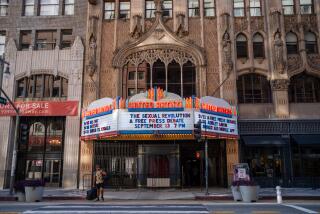French Firm Opens Flashy Southland Hotel
- Share via
San Diego could eventually be home to a luxury hotel built by the French development firm that has just opened its first flashy Southern California hotel.
Meridien Hotels Inc. opened its new, 10-story, 440-room, $55-million pyramid-like hotel in Newport Beach Thursday. And, despite the surge of luxury hotel building in the Southland, officials of the French firm said that their new hotel not only will be profitable, but also will lead the way to more Meridian projects in Southern California.
Pierre Chapgier, president of Meridien Hotels Investments Group. Inc., which scouts for new hotel development sites for its parent company, said Meridien will be looking at possible sites in San Diego and Palm Springs.
But those expansions, he said, will not be considered until after projects in Orange and Los Angeles counties are established.
The new hotel, said Chapgier, has a weapon that gives it an edge over the competition: “Snob appeal,” reflected in French cuisine, plush appointments and personal service.
Seeking to attract primarily a business clientele, the hotel provides telephones in its rooms with “hold” buttons and IBM personal computers that its guests can lease by the hour.
Room rates at the Meridien--on MacArthur Boulevard near the John Wayne Airport in Newport Beach--will range from $115 a day for a standard single room to $1,000 a day for the Presidential Suite.
Meridien Hotels manages hotels that are built and financed by others. The Newport Beach Meridien was built by MacArthur Hotels Limited Partnership, a joint venture of the Hass & Haynie Corp. and T.A.G. Group S.A., on 7.5 acres owned by The Koll Co. and Aetna Life Insurance Co.
Chapgier said the company currently is negotiating to manage a new hotel that may be built in Beverly Hills and is considering the possibility of managing another new project in downtown Los Angeles.
The company earned only $3 million on $40 million in revenues in 1984 because, according to Paul Bruyant, president of the parent company, much of its revenue was spent to support rapid expansion worldwide.
More to Read
Inside the business of entertainment
The Wide Shot brings you news, analysis and insights on everything from streaming wars to production — and what it all means for the future.
You may occasionally receive promotional content from the Los Angeles Times.










